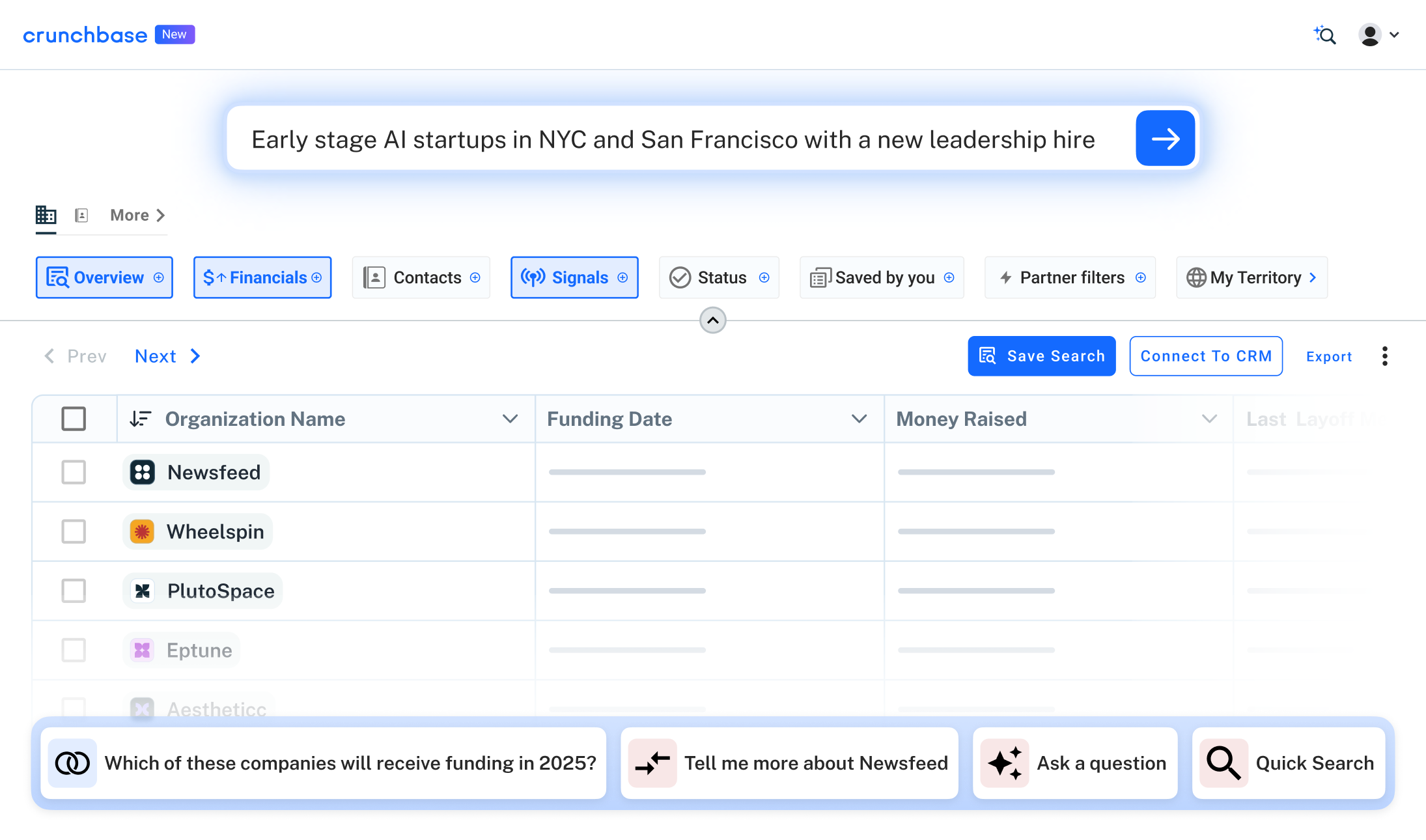This article is part of the Crunchbase Community Contributor Series. The author is an expert in their field and a Crunchbase user. We are honored to feature and promote their contribution on the Crunchbase blog.
Please note that the author is not employed by Crunchbase and the opinions expressed in this article do not necessarily reflect official views or opinions of Crunchbase, Inc.
As an early stage business creation platform, we meet founders at the earliest stages of building their businesses. Seeing the areas that are attracting the most talented founders, gives us a unique perspective on the greatest opportunities for value creation. Founders lead the way for showing the whitespace in their industries and it is clear that health and wellness has become one of the most important categories.
In response to this burgeoning trend in February 2020, we called for founders to build with us within the categories of health & wellness for our inaugural “Humans in the Wild” Entrepreneur-in-Residence cohort. We admitted our first class of intrepid founders, launching a would-be-in-person program just days before the very industry we set out to disrupt was turned completely inside out by the pandemic. Three months later, despite the challenges they faced, our 12 founders had made immense progress building their businesses across broad areas including virtual primary care for people of color, postnatal nutrition, sleep hygiene, and hearing health.
A year later, healthcare continues to transform at a rapid pace. There has never been a better time to bring entrepreneurial, problem-solving approaches to challenges both new and old. We can’t wait to launch our next cohort of founders and for the opportunity to continue supporting innovation in health and wellness. In this post, we’ll discuss some of the key trends we’re seeing after meeting with hundreds of founders over the last year and where we’re doubling down with our time and resources over the next 12 months and beyond.
Telehealth is Not a Category, it’s Table Stakes
No longer a separate category, telehealth is now a layer that spans the entire industry as we enter what a16z recently described as “new golden era for tech-enabled healthcare”. Instead, we’re seeing digital health platforms verticalize to super-serve the needs of specific communities. Human Ventures has already invested in companies at the forefront of this trend, including portfolio companies Spora Health (redefining primary care for people of color), Tia (a new paradigm for modern female healthcare), Elektra Health (a next gen platform for women going through menopause), and Paloma Health (the first online medical practice focused specifically on hypothyroidism). We’ll continue to see more community- and demographic-centric digital health platforms emerge that bake in virtual care as a feature.
The next phase of these platforms will also address accessibility for those who continue to be overlooked. Some of the questions and white spaces we’ve been considering include: how will we use tech to help seniors and their caretakers navigate digital-by-default environments? What will the next phase of community-centric care look like as we better serve women, LGBTQ and BIPOC people? What about those with chronic diseases or disabilities?
We also believe the influence of at-home care will overturn long-ingrained behavioral patterns related to how we take care of ourselves — especially with how we approach fitness and nutrition. As consumers grow accustomed to “telefitness” at home, new platforms can transcend what used to be limiting factors of fitness at scale: geography and equipment.
Digital fitness platforms built for specific communities and use cases will emerge as the proliferation of streaming and connected hardware like Peloton, Mirror, Zwift, and Tonal enable content-centric businesses to flourish. Another example where we’ve seen these trends is Future, which connects users virtually to real-life fitness coaches, and recently raised a $24M Series B.
Mental Health is Health
Mental healthcare is healthcare — it’s at the core of all healthcare. As our nation faces a crisis of not only physical health but mental health exacerbated by a year of remote work, isolation, loneliness, uncertainty, and anxiety, we are finally grappling with the reality of how to care for our whole selves, mental wellbeing included.
Late- and growth-stage venture dollars have poured into more established mental health startups like Talkspace (which was recently valued at $1.4B and will go public via a SPAC), Calm (recently valued at $2B), Headspace (which raised over $110M in 2020 alone), Lyra (recently raised at a reported $2.25B valuation), and Modern Health (now valued at over $1B). This first wave of mental health businesses will only scratch the surface of the overall need.
The next phase of mental health disruptors will focus on specific demographics and needs as well as improve delivery with new paradigms for mental health.
One example is group therapy, which can lower the cost of care for participants, broaden the reach of psychologists who are already stretched thin, and allows mental health to have a natural element of community built-in. Real, a startup using a subscription membership model to offer group therapy and communities, recently raised a $6M seed round. Pace is another recently launched, early-stage company offering group therapy. In addition to group therapy, technology will play a bigger role in care delivery. One such example is AI-driven personalized content delivery platform Bloom, which uses a model similar to Headspace or Calm to connect users with content grounded in cognitive behavioral therapy principles.
We’ll also see a rise of platforms addressing the specific mental health needs of those with acute behavioral health disorders as mental health technology expands into more specialized applications.
Platforms addressing the drivers of mental health, like sleep, substance abuse, and loneliness will continue to emerge. Human Ventures’ portfolio company Deep addresses the sleep coaching angle, while Monument and Cutback Coach have established themselves as key players in alcohol behavior management. Companies focusing on loneliness in demographics that tend to be more isolated, like seniors, imbued with community development as a core feature will launch to address these underserved groups.
The Consumerization of Healthcare
In an era where every vertical has a direct-to-consumer disruptor, it only makes sense that we’d begin to approach our healthcare the same way. We’ve seen a surge in investment in companies like Everlywell, which recently raised $175M and offers at-home test kits for COVID-19 and dozens of other applications.
We’ll see health-centric businesses like Human Ventures’ portfolio company Hark Wellness, which considers itself a “hearing wellness company,” follow the playbook of direct-to-consumer and emerging brands, leading with content, community, and consumer-friendly branding strategy as a conversion funnel to their physical products and virtual services.
As the line between wellness and healthcare continues to blur, the difference between patients and consumers will get fuzzy as well. Users will expect to own and track their health data and look for ways to optimize it, giving rise to platforms that will unlock portability of personal medical data between platforms. Users will easily access a dashboard of their medical histories as easily as a workout history on Peloton.
The line between consumer technology and health will continue to feel arbitrary as wearables like the Oura ring, for example, are marketed as a sleep and activity tracker, but have the ability to flag potential coronavirus infections before symptoms occur based on temperature, heart and respiratory rates, and sleep patterns.
Women’s health — the whitespace continues
For all the innovation that we’ve seen in recent years, we’ve barely scratched the surface of women’s health. Venture dollars, to date, have poured into fertility and “fem tech” businesses like kindbody (which has raised $64M to disrupt the fertility clinic), Nurx (originally focused on birth control; has raised $116M), Pill Club (a Nurx competitor that has raised at least $67M), and Maven (focused on women and family health and has raised $88M). However, like with mental health’s earliest digital disruptors, women’s health innovation is still in phase one.
There’s of course a massive market around maternal health, fertility, and democratizing access to basic needs like birth control, but women’s health is about serving women’s needs beyond motherhood. Human Ventures has invested in two leaders in the space: Tia Clinic, the modern medical home for women, and Elektra Health, expert advice and guidance for women going through menopause.
Businesses will emerge to address the needs of women along life stages that are still not being served by mainstream healthcare. Examples span a broad range of categories, from better information for navigating women’s sexual health and wellness, to postpartum nutrition and mental health, to perimenopause and menopause.
As we wrote in our health and wellness thesis post last year, we believe we are reaching a turning point where women’s health will be understood to include all issues that impact women differently or more severely than men, including mental health, various chronic conditions and even financial and social health.
As we enter the second year of the pandemic and hopefully a light at the end of the tunnel, we know the need for innovation in health and wellness will continue to evolve at a rapid pace. Human Ventures will continue to look for opportunities to partner with visionary founders building in these areas, through both our fund and our venture studio for Entrepreneurs-in-Residence, Humans in the Wild.
About Human Ventures
Human Ventures is a business creation platform. We invest in and build early-stage businesses with ambitious founders who are innovating around human needs. By unlocking access to a powerful network of founders, investors and corporate partners, we are creating a blueprint for the future of business to be built on purpose. If you are building or investing in any of these health and wellness areas or the broader Human Needs Economy, we’d love to hear from you.
About Heather Hartnett
Heather Hartnett is General Partner and CEO of Human Ventures. She is an active leader in the technology community creating one of New York’s premiere startup studios and early stage venture funds. Since launching under Heather’s leadership, Human Ventures has invested in and co-built more than 40 companies, with key investments including Reserve (acquired), TheSkimm, Current, Tiny Organics and Paloma Health. Heather also serves on the board of Trilantic Capital Partners Founder’s Council, Jack Creek Investment Corp, AARP’s Innovation Council and Summit Impact.
.svg)




.png)
.png)
